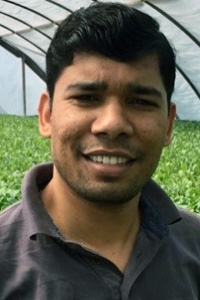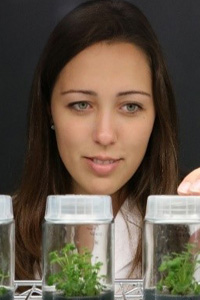Marine Bioproducts / Plant Biostimulants Research Laboratory
 Emily Peters, M.Sc. (Lab Manager)
Emily Peters, M.Sc. (Lab Manager)
emily.peters@dal.ca
Education:
B.Sc. Agr. (2010 – 2014), Dalhousie University Faculty of Agriculture
M.Sc. Applied Science (2014 – 2016), Saint Mary’s University
M.Sc. Thesis:
Effects of growth-promoters on the productivity of Arundo donax L. (NileFiber™) grown as a purpose-grown biofuel feedstock in Nova Scotia.
Emily graduated from the Faculty of Agriculture in 2014 with a Bachelor of Science (Agr) majoring in Environmental Science, minoring in Plant Science. Emily also completed a certificate in Organic Agriculture. In 2016, Emily graduated from Saint Mary’s University with a Master’s in Applied Science. Emily is also a research scientist with Oceland Biologicals Limited.
 Pramod Kumar Rathor (PhD. Student)
Pramod Kumar Rathor (PhD. Student)
pramod.rathor@dal.ca
Education:
B.Sc. Agr. (2008 – 2012), Tamilnadu Agricultural University (India)
B.Tech. (2011-2013), Dalhousie University (Canada)
M.Sc. (2013 – 2014), Dalhousie University (Canada)
PhD. (2014-2018), Dalhousie University (Canada)
M.Sc. Thesis:
Arabidopsis thaliana Glycine Rich RNA Binding Protein 3 (GR-RBP3) is a Negative Regulator of Salinity Stress. (Supervisor: Dr. Balakrishnan Prithiviraj)
PhD. Thesis:
Functional genomics of abiotic stress tolerance in the brown algal model Ectocarpus siliculosus using an Arabidopsis toolbox.
Pramod’s current project involves the isolation and overexpression of brown algal genes in Arabidopsis thaliana to improve abiotic stress tolerance. In this study, he has identified and characterized a number novel genes of brown algae that impart abiotic stress tolerance in Arabidopsis.
 Sarah Fancy (M.Sc. student)
Sarah Fancy (M.Sc. student)
sarah.fancy@dal.ca
Sarah completed her undergraduate degree with honours in Environmental Science at Acadia University, where she was an Irving Scholar and the recipient of the University Medal in Environmental Science. While at Acadia, Sarah worked in the Plant Stress Laboratory at Acadian Seaplants Limited through the co-op program, and these experiences ultimately led to her Master’s research.
Sarah is currently studying how chemical components Ascophyllum nodosum extract influences plant-microbe interactions.
 Monica Sandepogu (M.Sc. student)
Monica Sandepogu (M.Sc. student)
s.monica@dal.ca
Education:
B.Sc. Agr. (2010 – 2014), Annamalai University (India)
M.Sc. (2016 – 2018), Dalhousie University (Canada)
M.Sc. Thesis:
Seaweed extracts and Humic acids as biostimulants to improve growth and post-harvest quality of lettuce and spinach. (Supervisor: Dr. Balakrishnan Prithiviraj)
The main objective of Monica’s Master’s research is to identify the most effective combinations of seaweed extracts and humic acids that enhance seed germination, growth and nutritional quality of the leafy vegetables
 Sruti Bajpai (M.Sc. student)
Sruti Bajpai (M.Sc. student)
M.Sc. Thesis:
Management of powdery mildew of strawberry with the application of seaweed extract.
The main objective of Sruti’s Master’s research is to investigate the management of powdery mildew of strawberries through the application of Ascophyllum nodosum extracts.
 Dr. Jaisingh Patel (Post-Doctoral Fellow)
Dr. Jaisingh Patel (Post-Doctoral Fellow)
Dr. Jaisingh Patel completed his Master’s degree in plant biotechnology from the Department of Genetics and Plant Breeding, Institute of Agricultural Sciences, Banaras Hindu University, Varanasi, India in 2010. During his Master’s research, Dr. Patel characterized the certain isolates of Pseudomonas fluorescens as protection against Helicoverpa armigera in chickpea plants. Dr. Patel continued his research at Banaras Hindu University, completing his Ph.D. In Plant Technology (Department of Botany) in 2017. His PhD. research was on using a consortium of Pseudomonas fluorescens and Trichoderma asperellum as biocontrol against powdery mildew of pea. Additionally, he characterized the effect of the bioagents and the pathogen on the lignin synthesis pathway and as well as the induction of defense by G-protein signalling in pea plants.
Dr. Patel’s current work as a member of the Marine Bio-Products Research Laboratory involves developing a formulation with seaweed extract to increase viability of beneficial microorganisms for sustainable agriculture.
Important Publications:
Patel, J. S., Sarma B. K., Singh, H. B., Upadhyay, R. S., Kharwar, R. N., Ahmed, M. (2016). Pseudomonas fluorescens and Trichoderma asperellum enhance expression of Gα subunits of the pea heterotrimeric G-protein during Erysiphe pisi infection. Frontiers in Plant Science, 6:1206.
Patel, J. S., Kharwar, R. N., Singh, H. B., Upadhyay, R. S., & Sarma, B. K. (2017). Trichoderma asperellum (T42) and Pseudomonas fluorescens (OKC)-enhances resistance of pea against Erysiphe pisi through enhanced ROS generation and lignifications. Frontiers in Microbiology, 8, 306.
 Dr. Pushp Sheel Shukla (Post-Doctoral Fellow)
Dr. Pushp Sheel Shukla (Post-Doctoral Fellow)
pushpsheel.shukla@dal.ca
Dr. Pushp Sheel Shukla completed his Master’s degree with a specialization in plant biotechnology. Dr. Shukla continued his research by completing his PhD. from the Central Salt and Marine Chemical Research Institute, Gujarat, India. His Ph,D. research was on stress responsive MYB transcription factors of succulent halophyte, Salicornia brachiata.
As a member of the Marine Bio-Products Research Laboratory, Dr. Shukla is conducting research in understanding the mode of action of seaweed based biostimulants in mitigating abiotic stresses and improved nutrient-use efficiency. The primary aim of this research is to identify and characterize miRNAs involved in Ascophyllum nodosum extract-mediated salinity tolerance in Arabidopsis thaliana.
 Dr. Mohd Adil (Post-Doctoral Fellow)
Dr. Mohd Adil (Post-Doctoral Fellow)
mohd.adil@dal.ca
Dr. Mohd Adil completed his undergraduate degree in biochemistry and completed his Master’s in biotechnology. Dr. Adil furthered his research in biotechnology at Aligarh Muslim University in Uttar Pradesh, India where he completed his Ph.D. Dr. Adil’s doctoral research consisted of investigating the mechanism of biofilm, quorum sensing and drug resistance in bacteria. More specifically, this research focused on the possible mechanism of antimicrobial agents isolated from medicinal plants against Streptococcus species.
Dr. Adil’s current research within the Marine Bio-Products Research Laboratory is on identifying and characterizing bioactive compounds from the fermentation of seaweed.
 Dr. L.R. Gunupuru (Post-Doctoral Fellow)
Dr. L.R. Gunupuru (Post-Doctoral Fellow)
Dr. L. R. Gunupuru completed his Master’s of Technology in Biotechnology from the Department of Biotechnology at the Indian Institute of Technology Guwahati (India) in 2011. His MSc. research involved characterizing the function of ABA receptor in improving plant abiotic stress resistance. Dr. Gunupuru further his research by completing his PhD. in Molecular Biology and Plant Pathology in 2016 from the School of Biology and Environmental Sciences, University College Dublin in Ireland. Dr. Gunupuru’s doctoral research was characterizing a wheat Cytochrome P450 and a Leucine Rich Repeat (LRR) receptor from wheat and barley in response to Fusarium infection and mycotoxin accumulation.
Dr. Gunupuru’s current research in the Marine Bio-Products Research Laboratory focuses on elicitors in seaweed to improve plant overall health and to identify the molecular response these extracts elicit during plant defence response.
 Dr. Tudor Borza
Dr. Tudor Borza
tudor.borza@dal.ca
Dr. Tudor Borza completed three degrees, including a PhD. in Plant Genetics at the “Babes-Bolyai” University (Faculty of Biology) in Cluj-Napoca, Romania. Dr. Borza also worked at the university as an instructor, assistant professor and lecturer. He received additional training at the Vienna Biocenter, Department of Plant Genetics in Austria. Dr. Borza has an extensive background in research: he worked as a post-doctoral fellow in the Laboratory of Structural Chemistry of Macromolecules at the Pasteur Institute in Paris, France as well as in the Department of Biochemistry, Biophysics and Molecular Biology at Iowa State University (Ames, USA). Dr. Borza also held a position as a research scientist at Genome Atlantic in Halifax, and as a research associate in the Department of Plant, Food and Environmental Science at Dalhousie University in Truro.
Dr. Borza’s current research interests include:
- Plant-pathogen interaction mediated by bioactive products
- The effects of fungicides on plant pathogens
- The evolution of genes involved in pathogenicity in fungal and fungal-like pathogens and of genes from plants involved in resistance to pathogens
- Plant, animal and microbial genetics
- Development of genetic markers, transcriptomics and metabolomics
- Metabolic engineering by using recombinant enzymes in bacteria and yeasts.
 Tatiana Al-Mughrabi (Summer Student)
Tatiana Al-Mughrabi (Summer Student)
tt332719@dal.ca
Tatiana’s research in the Marine Bio-Products Research Laboratory consists of investigating Verticillium wilt and early dying syndrome in potato plants.
Education:
B.Sc. (2015 – 2019), Dalhousie University
Research Interests:
- Genetics and molecular biology
- Microbiology
- Immunology
 Vinod Kumar S (Post-Doctoral Fellow)
Vinod Kumar S (Post-Doctoral Fellow)
vinodfytopathologos@gmail.com
- B.Sc. Agriculture (2008 to 12)
- M.Sc. Agriculture in Plant Pathology (2012 to 14)
- Ph.D. Plant Pathology (2014 to 18)
Research expertise:
M.Sc. Thesis - Biological and chemical control of stem rot and foliar diseases of carnations under protected cultivation (Supervisor - Dr. S. Nakkeeran, TNAU, India).
Ph.D. Thesis - Emergence of tobacco streak virus: investigations on symptom expression, transmission, spread and management (Supervisor - Dr. S. Nakkeeran, TNAU, India).
1. Isolation and characterization of plant pathogens infecting carnations - Sclerotinia sclerotiorum, Botrytis cinerea, Cladosporium echinulatum.
2. Full-length gnome characterization of tobacco streak virus (TSV) infecting cotton.
3. Agrobacterium mediated transformation of coat protein and movement protein genes of TSV and expression profiling of plant defense related enzymes including peroxidase, poly phenol oxidase and phenylalanine ammonina lyases upon interaction
4. Isolation, identification and mode of action studies in Bacillus species with antimicrobial peptide (AMP) genes and Trichoderma species producing hydrolytic enzymes.
5. Assessment of the efficacy of plant growth promoting microbes in biological control of plant diseases.
Current Research
Molecular plant root-microbe interactions. Rizosphere and in planta microbiome.
Featured publications:
Orcid id: orcid.org/0000-0002-0567-0615
Website/blog: https://vinodkumarplantpathology.wordpress.com/
